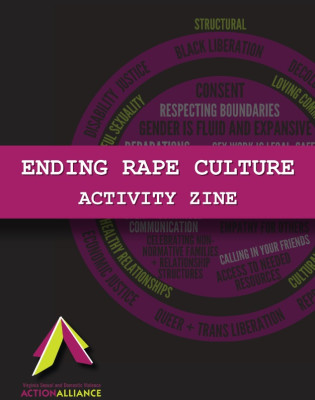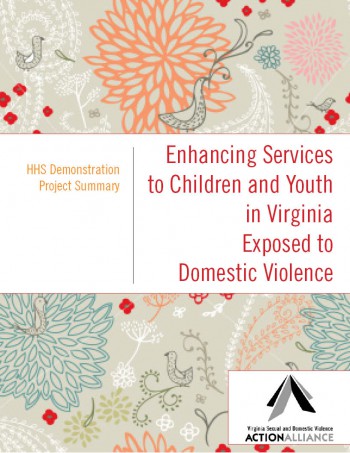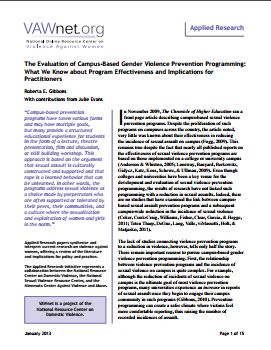Resources Library: Advocates
Start a Search:
Elder Abuse, Neglect, and Exploitation
Who are the victims of elder abuse, neglect and exploitation? Does it surprise you to know that most elder mistreatment is committed, not by strangers, but by persons known to the victim, such as family members, caregivers and others in positions of trust? How is suspected abuse reported? And how can professionals work collaboratively to better address this complex issue?
These questions and more are addressed in this archived webinar and power point presentation titled “Elder Abuse, Neglect and Exploitation.” Dr. Paula Kupstas and Lisa Furr of the Virginia Center on Aging presented on the topic; Dr. E. Ayn Welleford (Virginia Commission on Alzheimer’s Disease and Related Disorders/Virginia Commonwealth University) moderated the discussion.
https://alzpossible.org/elder-abuse-neglect-and-exploitation-2/
Ending Rape Culture - Activity Zine

HOW DO WE ENVISION A BETTER WORLD?
This zine includes talking points and activities to help you facilitate that visioning conversation and support or shape your approach to violence prevention work.
The Rape Culture Pyramid and Ending Rape Culture Activity were created by the Virginia Sexual and Domestic Violence Action Alliance as a resource for community agencies, educators, and organizers to better understand and talk about rape culture.
Enhancing Services to Children and Youth in Virginia Exposed to Domestic Violence

A report on a 2-year (2006-2008) demonstration project funded by the Family Violence Prevention and Services Program.
Published by Virginia Sexual & Domestic VIolence Action Alliance, 2009.
56 pages.
Ensuring Access to Services for Survivors with Limited English Proficiency: Frequently Asked Questions
Originally posted on VAWnet and created by Casa de Esperanza, this resource is a compilation of the answers to frequently asked questions regarding Title VI of the Civil Rights Act, which requires all programs that receive federal funds to take reasonable steps to ensure meaningful access to individuals with Limited English Proficiency. Ensuring meaningful access to services is critical to protecting the life and safety of survivors with limited English proficiency (LEP). This document explains the requirements, provides examples for implementation, and provides links to numerous additional resources.
Evaluation of Campus Based Gender Violence Prevention Programming from VAWnet

Colleges and universities have been a key venue for the development and evaluation of sexual violence prevention programming. However, there are no studies demonstrating a link between campus-based sexual assault prevention programs and a subsequent campus-wide reduction in the incidence of sexual violence (Coker, Cook-Craig, Williams, Fisher, Clear, Garcia, & Hegge, 2011; Teten Tharp, DeGue, Lang, Valle, Massetti, Holt, & Matjasko, 2011).
Nevertheless, there remain important reasons to pursue campus-based gender violence prevention programming:
- Prevention programming can create a safer climate where victims feel more comfortable reporting, actually raising the number of recorded incidences of assault.
- Using a decrease in the incidence of sexual assault as the only measure of success for prevention programs ignores many other short- and intermediate-term goals that are conceptually linked to a reduction in sexual assault, such as increasing students knowledge about rape and changing attitudes related to rape so that students are less likely to blame victims (Anderson & Whiston, 2005; Lonsway, Banyard, Berkowitz, Gidycz, Katz, Koss, Schewe, & Ullman, 2009).
- Research shows that a significant number of woman experience sexual violence while in college (Fisher, Cullen, & Turner, 2000; Koss, Gidycz, & Wisniewski, 1987; Krebs, Lindquist, Warner, Fisher, & Martin, 2007; Black et. al., 2011).

